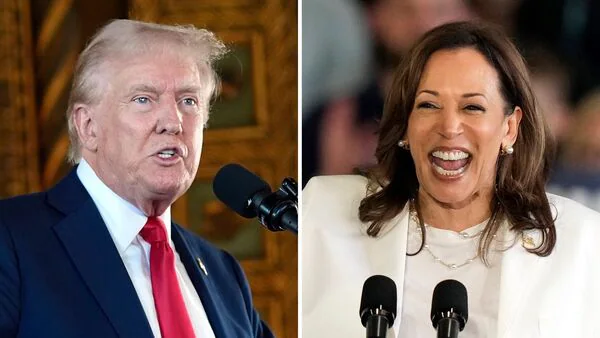
US presidential polls: Harris leads Trump nationally, but key swing state races tighter
Race so close in swing states one commentator this week called it the ‘equivalent of a knife fight in a phone booth’
As next week’s crucial presidential debate looms into view, Kamala Harris has maintained her narrow lead over Donald Trump in head-to-head polls but is locked in a tighter race in the crucial swing states needed to win the US election.
Ever since Harris entered the contest – after Joe Biden dropped out following a disastrous debate performance that highlighted fears over his age and mental acuity – the vice-president has ridden a wave of support and enthusiasm, turning the race on its head. A solid but slight Trump advantage morphed into a Harris lead.

But as Harris faces her first ever debate as a presidential nominee, there are signs that her upwards swing has hit a ceiling. Meanwhile, Trump will be hoping the debate offers his campaign a chance to recapture some momentum.
Yet the race remains so tight in the swing states – and with a Republican advantage in the electoral college – that one commentator on Politico this week called it the “equivalent of a knife fight in a phone booth”.
At the same time, the narrow geographical focus of the election is sharply coming into view, with the first ballots to determine the next occupant of the White House due to be mailed out to voters.
North Carolina had aimed to start mailing out its presidential ballots on Friday. But in what might be seen as a metaphor for the cliffhanging nature of the contest between Harris and Trump, what should have been standard protocol was delayed by a dispute over whether Robert F Kennedy Jr, hitherto running as an independent candidate, should have a place on the ballot.

Kennedy, who suspended his campaign on 23 August and endorsed Trump, is suing the North Carolina board of elections over its refusal to remove his name from the ballot in a state where surveys show the result on a knife edge.
A judge on the state’s supreme court ruled against him on Thursday but gave him 24 hours to appeal – resulting in a temporary delay to ballots being dispatched. And on Friday, the state’s appeals court issued an interim stop on the dissemination of mail-in ballots to allow Kennedy’s appeal to be heard.
The postponement added another layer of suspense to a contest that could not be tighter, according to fresh Guardian analysis of recent polls.
In a state with 16 electoral college votes up for grabs but where a Democratic presidential candidate has won only once since 1980, Trump and Harris are deadlocked at 48.07%.
The figures illustrate why Kennedy – who is trying to help Trump after concluding that his presence in the race was draining his support – is so keen to remove his name from the ballot.

A tiny number of voters putting their cross next to Kennedy’s name on ballot papers could be enough to deprive Trump of the only one of seven swing states he won in his 2020 defeat at the hands of Joe Biden.
The North Carolina imbroglio shows in a microcosm what has become a reality of this – and, increasingly, all – US presidential elections: that while voters will flock to the polls across all 50 states, some states matter more than others under America’s unique electoral college.
The system designates a set number of electors for each state based on population – with 539 for the entire country, meaning that 270 electoral college votes are needed to win.

While the outcome in numerous states is a foregone conclusion – with many southern and midwestern states reliably Republican and others like New York and California solidly Democratic – the roughly equal partisan division of such states in electoral vote terms means much rests on the small number where party loyalties are evenly split.








